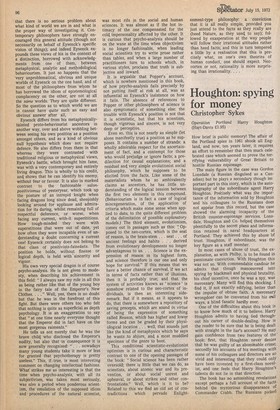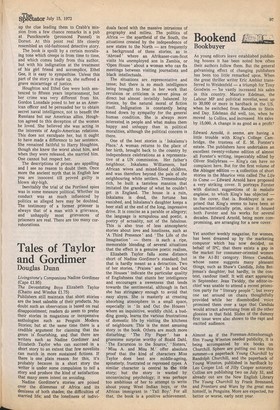Houghton: spying for money
Christopher Sykes
Operation Portland Harry Houghton (Hart-Davis £1.95) How brief is public memory! The affair of the Portland spies in 1961 shook all Eng land, and now, ten years later, it requires an effort to remember that then much celebrated case which seemed to prove the terrifying vulnerability of Great Britain to hostile Russian espionage.
The main figure in the case was Gordon Lonsdale (a Russian disguised as a Canadian) but he plays a secondary though im. portant part in this story, which is the autobiography of the subordinate agent Harry Houghton. Precisely what was the impor tance of the information sold by Houghton 'and his colleagues to the Russians does not appear from this record, but the case showed the alarming incapacity of the British counter-espionage services. Lonsdale, Houghton and Co. helped themselves plentifully to the secret plans and information retained in naval headquarters at Portland. They achieved this by abuse bf trust. Houghton, if subordinate, was the key figure as a staff member.
In most cases of abuse of trust, the explanation, as with Philby, is to be found in passionate conviction. With Houghton this was not so. With commendable candour he admits that though manoeuvred into spying by blackmail and physical brutality, his chief incentive, once he was a spy, was mercenary. Many will find this shocking. I find it, if not exactly edifying, better than the impulse of obtuse faith. A mercenary wrongdoer can be converted from his Emil ways, a blind fanatic hardly ever.
One of the difficulties abput this book is to know how much of it to believe. Harry Houghton admits to having lied throughout his career of double-dealing. How is the reader to be sure that he is being dealt with straight in the liar's account? He may gain confidence from two features of the' book: first, that Houghton never denies that he was guilty of an abominable crime; secondly his accounts of his meetings with some of his colleagues and directors are so vivid and interesting that they could only have been invented by a first-class novelist, and one feels that Harry Houghton's talents do not lie in that direction.
The book has no astonishing revelations except perhaps a full account of the facts behind the mysterious disappearance of Commander Crabb. The Russians picked up the clue leading them to Crabb's mission from a few chance remarks in a pub at Puncknowle (prounced Punnel) in Dorset. At this point real life closely resembled an old-fashioned detective story.
The book is spoilt by a certain moralising tone which creeps in from time to time, and which comes badly from this author, but with his indignation at the treatment of his girl friend and accomplice, Ethel Gee, it is easy to sympathise. Unless this part of the story is made up, she suffered a grave miscarriage of justice.
Houghton and Ethel Gee were both sentenced to fifteen years imprisonment, but her crime was very different from his. Gordon Lonsdale posed to her as an American officer and he persuaded her to obtain secret naval intelligence, not to benefit the Russians but our American allies. Houghton agreed to this deception of the woman he loved. She believed she was acting in the interests of Anglo-American relations. This does not exculpate her, but it ought to have made a difference to her sentence. She remained faithful to Harry Houghton, though she knew the worst about him, and when they were released, she married him. One cannot but respect her.
The descriptions of prison are appalling and I see no reason to doubt them. Once more the ancient myth that in English law you are innocent till proved guilty is blown sky-high.
Inevitably the trial of the Portland spies was in some measure political. Whether its conduct was as much influenced by politics as alleged here may be doubted. The testimony of a former prisoner is always that of a man with a grievance, and unhappily most grievances of prisoners are real. There are too many corroborations.











































 Previous page
Previous page